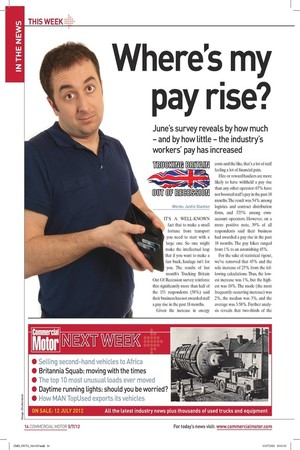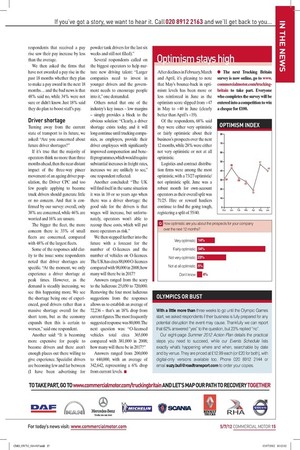Where’s my pay rise?
Page 10

Page 11

If you've noticed an error in this article please click here to report it so we can fix it.
June’s survey reveals by how much – and by how little – the industry’s workers’ pay has increased
Words: Justin Stanton
IT'S A WELL-KNOWN fact that to make a small fortune from transport you need to start with a large one. So one might make the intellectual leap that if you want to make a fast buck, haulage isn’t for you. The results of last month’s Trucking Britain Out Of Recession survey reinforce this: significantly more than half of the 151 respondents (58%) said their business has not awarded staff a pay rise in the past 18 months.
Given the increase in energy costs and the like, that’s a lot of staff feeling a lot of financial pain.
Hire or reward hauliers are more likely to have withheld a pay rise than any other operator: 67% have not boosted staff’s pay in the past 18 months. The result was 54% among logistics and contract distribution firms, and 37.5% among ownaccount operators. However, on a more positive note, 39% of all respondents said their business had awarded a pay rise in the past 18 months. The pay hikes ranged from 1% to an astonishing 45%.
For the sake of statistical rigour, we’ve removed that 45% and the sole increase of 25% from the following calculations. Thus, the lowest increase was 1%, but the highest was 10%. The mode (the most frequently occurring increase) was 2%, the median was 3%, and the average was 3.58%. Further analysis reveals that two-thirds of the respondents that received a pay rise saw their pay increase by less than the average.
We then asked the firms that have not awarded a pay rise in the past 18 months whether they plan to make a pay award in the next 18 months... and the bad news is that 48% said no, while 34% were not sure or didn’t know. Just 18% said they do plan to boost staff’s pay.
Driver shortage
Turning away from the current state of transport to its future, we asked: “Are you concerned about future driver shortages?” If it’s true that the majority of operators think no more than three months ahead, then the near-distant impact of the three-way pincer movement of an ageing driver population, the Driver CPC and too few people applying to become truck drivers should generate little or no concern. And that is confirmed by our survey: overall, only 38% are concerned, while 46% are worried and 16% are unsure.
The bigger the fleet, the more concern there is: 33% of small fleets are concerned, compared with 48% of the largest fleets.
Some of the responses add clarity to the issue: some respondents noted that driver shortages are specific. “At the moment, we only experience a driver shortage at peak times. However, as the demand is steadily increasing, we see this happening more. We see the shortage being one of experienced, good drivers rather than a massive shortage overall for the short term, but as the economy expands then this is certain to worsen,” said one respondent.
Another said: “It is becoming more expensive for people to become drivers and there aren’t enough places out there willing to give experience. Specialist drivers are becoming few and far between (I have been advertising for powder tank drivers for the last six weeks and still not filled).” Several respondents called on the biggest operators to help nurture new driving talent: “Larger companies need to invest in younger drivers and the government needs to encourage people into it,” one demanded.
Others noted that one of the industry’s key issues – low margins – simply provides a block to the obvious solution: “Clearly, a driver shortage exists today, and it will long continue until trucking companies, as employers, provide their driver employees with significantly improved compensation and benefit programmes, which would require substantial increases in freight rates, increases we are unlikely to see,” one respondent reflected.
Another concluded: “The LTK will find itself in the same situation it was in 10 or so years ago when there was a driver shortage: the good side for the drivers is that wages will increase, but unfortunately, operators won’t able to recoup these costs, which will put more operators as risk.” We then stepped further into the future with a forecast for the number of O-licences and the number of vehicles on O-licences. The LTK has circa 88,000 O-licences compared with 98,000 in 2008; how many will there be in 2017?
Answers ranged from the scary to the ludicrous: 25,050 to 720,000. Removing the four most ludicrous suggestions from the responses allows us to establish an average of 72,236 – that’s an 18% drop from current figures. The most frequently suggested response was 80,000. The next question was: “O-licensed vehicles total circa 365,000 compared with 381,000 in 2008; how many will there be in 2017?” Answers ranged from 200,000 to 440,000, with an average of 342,642, representing a 6% drop from current levels. ■
Optimism stays high
After declines in February, March and April, it’s pleasing to note that May’s bounce-back in optimism levels has been more or less reinforced in June as the optimism score slipped from +47 in May to +40 in June (clearly better than April’s +19).
Of the respondents, 68% said they were either very optimistic or fairly optimistic about their business’s prospects over the next 12 months, while 28% were either not very optimistic or not at all optimistic.
Logistics and contract distribution firms were among the most optimistic, with a 73/27 optimistic/ not optimistic split. June was a robust month for own-account operators as their overall split was 71/25. Hire or reward hauliers continue to find the going tough, registering a split of 55/40. l The next Trucking Britain survey is now online, go to www. commercialmotor.com/truckingbritain to take part. Everyone who completes the survey will be entered into a competition to win a cheque for £100.
OLYMPICS OR BUST
With a little more than three weeks to go until the Olympic Games start, we asked respondents if their business is fully prepared for any potential disruption the event may cause. Thankfully we can report that 62% answered “yes” to the question, but 23% replied “no”.
Our eight-page Summer 2012 Action Plan details the practical steps you need to succeed, while our Events Schedule lists exactly what’s happening where and when, searchable by date and by venue. They are priced at £12.99 each (or £20 for both), with digital-only versions available too. Phone 020 8912 2144 or email suzy.bull@roadtransport.com to order your copies.










































